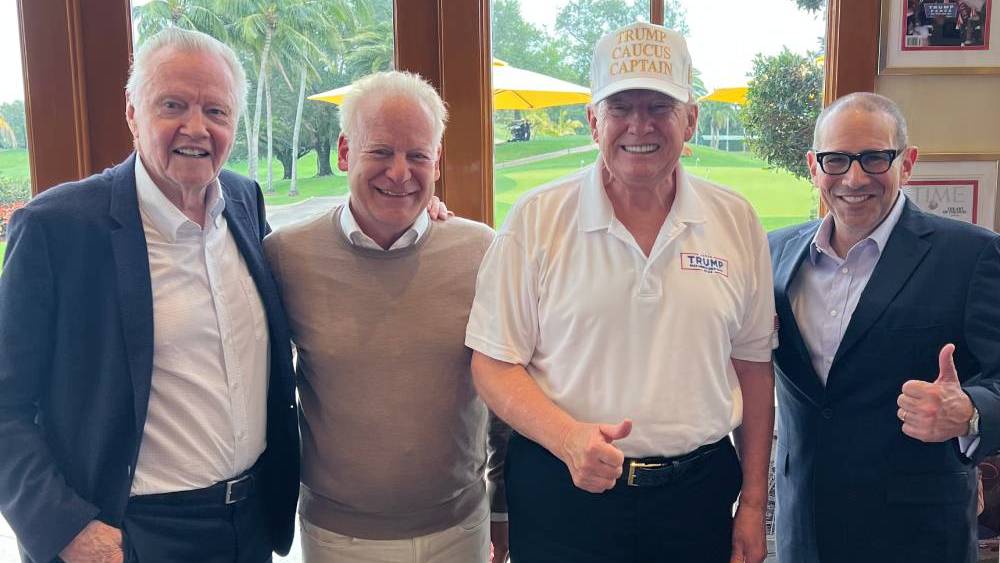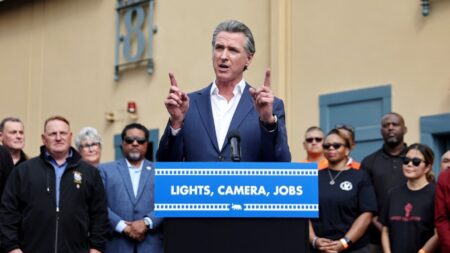Actor Jon Voight and his producing partner, Steven Paul, said Monday that they had submitted to President Trump a “comprehensive” plan to rescue the entertainment industry.
The plan includes federal incentives for production and post-production, co-production treaties with foreign countries as well as infrastructure subsidies for theater owners and production companies, job training, and changes to the tax code. The plan also calls for tariffs in “certain limited circumstances.”
“The President loves the entertainment business and this country, and he will help us make Hollywood great again,” Voight said in a statement.
Voight is one of three “special ambassadors” appointed by Trump to address Hollywood issues, along with Sylvester Stallone and Mel Gibson. Voight, Paul and SP Media Group/Atlas Comics President Scott Karol met with Trump over the weekend at Mar-a-Lago to present their proposal.
After the meeting, Trump announced on Truth Social that he would be authorizing a 100% tariff on foreign-made films, citing a national security threat. The announcement seemed premature, as the White House has since indicated that no decisions on tariffs have been made yet, and Trump has suggested he will meet with more industry leaders before moving forward.
“The American film industry, and Hollywood, is a beacon for teaching the American Dream to the world and is an engine for job growth and career opportunity,” Paul said in a statement. “It’s essential that we preserve America’s leadership in film and television production.”
Voight said he looked forward to working with the administration, the Hollywood studios, and unions on the proposal.
The International Alliance of Theatrical Stage Employees said Monday that it will work to bring production jobs back to the U.S. “while not disadvantaging our Canadian members or harming the industry overall.”
Both IATSE and SAG-AFTRA issued measured statements in response to Trump’s call for tariffs, expressing appreciation for the focus on the issue without endorsing the policy.
“President Trump has correctly recognized that the American film and television industry faces an urgent threat from international competition,” IATSE said in its statement.
Duncan Crabtree-Ireland, the executive director of SAG-AFTRA, also emphasized that his union, too, is focused on returning “good middle class jobs” to the U.S.
“We look forward to learning more about the specifics of the plan announced by the President and to advancing a dialogue to achieve our common goals,” he said.
The Motion Picture Association has yet to comment.
Trump has not endorsed a federal incentive for film production — a measure that would be met with universal support in Hollywood. Instead, his proposal suggests that U.S. studios should pay a steep price for shipping jobs overseas.
Matthew Loeb, the international president of IATSE, called for a “balanced federal response” to the issue.
“IATSE recommended that the Trump administration implement a federal film production tax incentive and other domestic tax provisions to level the playing field for American workers,” he said. “We await further information on the administration’s proposed tariff plan, but we continue to stand firm in our conviction that any eventual trade policy must do no harm to our Canadian members — nor the industry overall. We seek reciprocal trade practices that ensure fair competition for all IATSE members.”
Sen. Adam Schiff, D-California, is working on federal legislation to create a nationwide film incentive. In a statement Monday, he said that a blanket tariff could be harmful and have unintended consequences.
“I welcome the opportunity to work with the administration and my Republican colleagues to pass a globally competitive federal film incentive to bring back runaway production,” Schiff said.
Read the full article here








